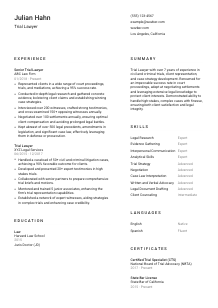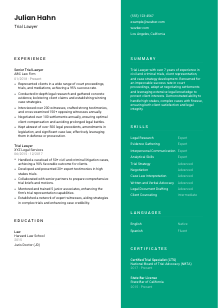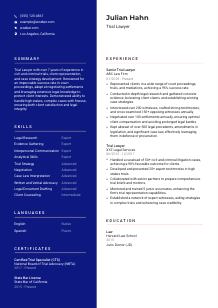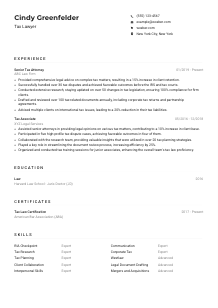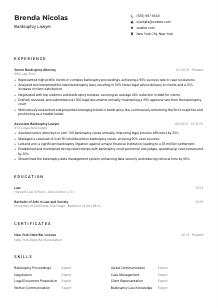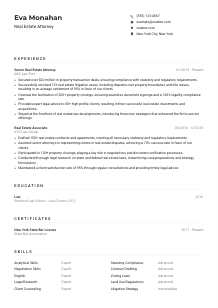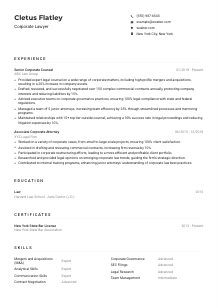Trial Lawyer CV Example
Winning arguments, but your CV seems noncommittal? Deliberate over this Trial Lawyer CV example, drafted with Wozber free CV builder. Grasp how to present your litigation prowess to align with courtroom criteria, scripting a legal career that's always in the right verdict!
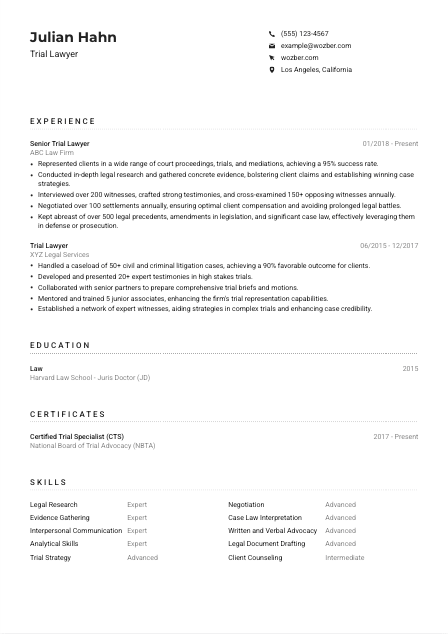
How to write a Trial Lawyer CV?
Embarking on the path to becoming a stellar Trial Lawyer involves more than just your expertise in the courtroom; it requires presenting your skills adeptly on paper. This isn't just any story – it's yours, where every word counts in showcasing your litigation prowess. With Wozber's free CV builder, your journey from drafting to landing your dream role as a Trial Lawyer becomes seamless, thanks to our ATS-friendly CV templates and ATS optimisation tools.
Ready to curate a CV that makes you the standout candidate? Let's demystify the process together, ensuring your CV is not just seen but remembered.
Personal Details
The Personal Details section is your CV's front door. It's where the first impression begins, so making it Trial Lawyer-specific and engaging is crucial. Let's make sure yours opens the door to opportunities.
1. Name as Your Brand
Start with your name, bold and proud, as the header. It's your brand, your mark of excellence. Make sure it's the beacon that guides the hiring manager through your CV.
2. Job Title Precision
Directly beneath your name, articulate the position you're gunning for - 'Trial Lawyer.' This mirrors the job description and aligns your CV from the outset.
3. Essential Contact Info
- Phone Number: Your lifeline for potential callbacks. Ensure it's correct, and you're always available at this number.
- Email Address: Should echo professionalism. A mixture of your first and last name at a popular email provider does the trick.
4. Location Matters
Being in Los Angeles is a must for this role. Highlight 'Los Angeles, California' in your contact details to reassure no relocation delays.
5. Professional Profiles
If you have a LinkedIn filled with legal accomplishments or a personal website showcasing your trials, include it. Just ensure the content mirrors your CV's professionalism.
Takeaway
Your Personal Details section is the handshake before the main act. Craft it to be professional and reflective of your readiness for the Trial Lawyer role. It's not just about being seen; it's about being remembered.





Experience
The 'Experience' section is where your legal battles shine through. Here, it's not just about stating roles; it's about narrating your journey in the legal arena, highlighting how each trial, each victory, has prepared you for the position at hand.
- Represented clients in a wide range of court proceedings, trials, and mediations, achieving a 95% success rate.
- Conducted in‑depth legal research and gathered concrete evidence, bolstering client claims and establishing winning case strategies.
- Interviewed over 200 witnesses, crafted strong testimonies, and cross‑examined 150+ opposing witnesses annually.
- Negotiated over 100 settlements annually, ensuring optimal client compensation and avoiding prolonged legal battles.
- Kept abreast of over 500 legal precedents, amendments in legislation, and significant case law, effectively leveraging them in defense or prosecution.
- Handled a caseload of 50+ civil and criminal litigation cases, achieving a 90% favorable outcome for clients.
- Developed and presented 20+ expert testimonies in high stakes trials.
- Collaborated with senior partners to prepare comprehensive trial briefs and motions.
- Mentored and trained 5 junior associates, enhancing the firm's trial representation capabilities.
- Established a network of expert witnesses, aiding strategies in complex trials and enhancing case credibility.
1. Matching Job Requirements
Firstly, cross-reference each requirement with your experience. If the job calls for '5 years of trial experience,' make sure your roles collectively reflect this invaluable courtroom exposure.
2. Role and Place
Chronologically list your positions, emphasizing those with 'Trial Lawyer' titles and responsibilities that resonate closely with the job description given.
3. Achievement Bullets
Under each role, bullet out your accomplishments. 'Represented clients in over 200 trials, achieving a 95% success rate' quantifies your impact vividly.
4. Quantify Where You Can
Numbers speak volumes. Whenever possible, attach metrics to your achievements, whether it's success rates, cases won, or settlements negotiated. This shows your value in concrete terms.
5. Relevance is Key
With limited space, prioritize experiences that best match the Trial Lawyer position. If it doesn't bolster your candidacy for this specific role, consider leaving it out.
Takeaway
Each element of your experience should be a testament to your suitability for the Trial Lawyer role. Tailor it to not just fit the job description, but to highlight how your past victories are prologues to your future successes in this new position.
Education
Your academic background is where your legal journey began. In the 'Education' section, present your credentials in a way that not only fulfills the requirements but also tells the hiring manager you're built on a strong legal foundation.
1. Degree Specifics
Confirming to the 'JD degree from an accredited law school' requirement is non-negotiable. Clearly list your Juris Doctor degree, ensuring there's no ambiguity about your qualification.
2. Present with Simplicity
Your highest degree (Juris Doctor), the institution (Harvard Law School), and graduation date (2015) must be prominent, creating an easy-to-follow educational timeline.
3. Degree Relevance
Since the job specifically asks for a JD, make sure yours is front and center. Highlight any law-related honors or achievements that serve to reinforce your dedication and distinction in the field.
4. Course Highlight
If you took specific courses that are directly relevant to being a Trial Lawyer, mention them. Courses on trial advocacy or evidence law are worth noting.
5. Further Education
For any post-JD education, like a Certified Trial Specialist (CTS) certification, make sure it's listed. This shows a commitment to your continued professional development.
Takeaway
Education is the cornerstone of your candidacy. Beyond degrees, it's where you first honed the skills and knowledge you bring to every trial. Ensure your education section clearly conveys the depth and breadth of your legal foundation.
Certificates
In the world of law, staying ahead means constantly sharpening your skills. The 'Certificates' section is your chance to showcase ongoing learning and specialization that sets you apart in the Trial Lawyer field.
1. Identify Relevant Certifications
Even though the job doesn't explicitly ask for certifications, listing relevant ones like 'Certified Trial Specialist' demonstrates your commitment to excellence in trial law.
2. Certificate Selection
Choose certificates that underline your expertise in trial work and legal research. This helps solidify your candidacy by showcasing your dedication to your craft.
3. Validity and Currency
For certificates with expiration dates, ensure they're current. This adds a layer of credibility and shows you're up-to-date with the latest legal practices.
4. Continuous Improvement
The legal field evolves, and so should you. Regularly update your certifications and look for courses that hone your skills further or broaden your specialization.
Takeaway
Each certificate you list is a pledge of your ongoing commitment to being the best in your field. Let them be a testament to your dedication to personal and professional growth in trial law.
Skills
The 'Skills' section is your chance to succinctly present the tools of your trade. For a Trial Lawyer, this means highlighting both the soft and hard skills that empower you to navigate the courtroom and legal strategies with adeptness.
1. Extracting Job Skills
Start by mapping out both evident and subtextual skills from the job description. Skills like 'strong analytical and research skills' should be explicitly mentioned.
2. Alignment with Job Description
For every skill listed in the job description, ensure you have a corresponding one to showcase. Prioritize those that the job emphasizes, like 'excellent interpersonal and communication skills.'
3. Organisation is Key
List your skills in a logical manner, separating hard skills (like 'Legal Research') from soft ones ('Interpersonal Communication'). This makes for an easily digestible and impactful read.
Takeaway
Your skills section is a snapshot of your professional arsenal. Curate it to convey not just competence but mastery, ensuring the hiring manager sees not just a candidate, but the Trial Lawyer their team needs.
Languages
In the diverse landscape of law, the ability to communicate across cultures can be invaluable. In this section, flaunt your linguistic prowess, especially if it enhances your ability to connect with clients or understand international laws.
1. Job Language Requirements
Given 'Proficient English language use is a job necessity,' your CV should reflect this clearly. If English is second nature to you, state it as 'Native' or 'Fluent.'
2. Primary Language Highlight
Ensure English is listed first, aligned with the job's requirements. If you're also fluent in Spanish, as the example showcased, it can demonstrate additional value.
3. Additional Language Assets
If you possess fluency in languages beyond what's required, list them. This can significantly bolster your profile, especially in legal issues that cross national boundaries.
4. Honest Proficiency Levels
Be candid about your level of language mastery. Misrepresenting your proficiency can lead to challenges down the line.
5. The Global Perspective
Especially pertinent in matters of international law, your language skills can underline your capability to handle cases with global implications, making you a versatile asset.
Takeaway
In the interconnected world of law, your language skills open doors to broader arenas. Let your CV reflect not just your legal acumen but your global communicative capability.
Summary
The 'Summary' section is like the opening statement of your case in court – it sets the stage for everything that follows. Here's how to craft a compelling narrative that aligns perfectly with the integral role of a Trial Lawyer.
1. Align with Job Essence
Start by synthesizing the job description's core demands. This sets the tone, signaling that your career trajectory lines up with what's sought for in a Trial Lawyer.
2. A Powerful Introduction
Lead with a statement that encapsulates your experience and specialties in law – 'Trial Lawyer with over 7 years of experience in civil and criminal trials.' This immediately presents you as a seasoned professional.
3. Highlight Key Accomplishments
Sprinkle in achievements that respond to the job's key requirements. If the role emphasizes trial experience or client representation, showcase your track record and success rates.
4. Conciseness Wins
While you may have a trove of experiences to share, the summary is about brevity and impact. Keep it to 3-5 lines, ensuring each word contributes to an image of professionalism and expertise.
Takeaway
Your summary is the first substantial impression the hiring manager has of you. Make it resonant, targeted, and reflective of your journey as a Trial Lawyer. It's your personal pitch - compelling, concise, and telling the story of why you're the right fit.
In Closing: Your Next Steps
You've crafted each section with care, aligning your CV sharply with the Trial Lawyer position's demands. But the journey doesn't stop here. Dive into Wozber's free CV builder, using our ATS-friendly CV templates for design and ATS optimisation tools, including an ATS CV scanner, to ensure your CV not only fits the criteria but stands out. Your legal acumen, paired with a precisely targeted CV, sets the stage for your next career victory.
Let the world see not just a CV, but a promise of the expertise and dedication you bring as a Trial Lawyer. The court is yours - make your case.

- JD degree from an accredited law school and admitted to the state bar.
- Minimum of 5 years of trial experience in civil or criminal cases.
- Thorough knowledge of state and federal laws, rules of evidence, and trial procedures.
- Strong analytical, research, and writing skills.
- Excellent interpersonal and communication skills to work with clients, opposing counsels, and judges.
- Proficient English language use is a job necessity.
- Must be located in Los Angeles, California.
- Represent clients in court proceedings, trials, mediations, and other legal proceedings.
- Conduct extensive legal research and gather evidence to build a compelling case strategy.
- Interview witnesses, prepare and present expert testimony, and cross-examine opposing witnesses.
- Negotiate settlements on behalf of clients, ensuring fair and just compensation.
- Stay updated with legal precedents, changes in legislation, and relevant case law to provide the best defense or prosecution for clients.





